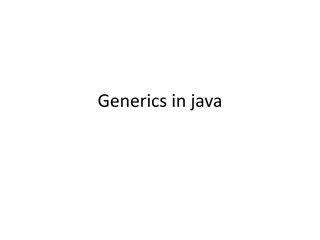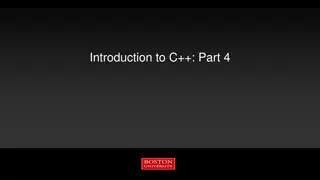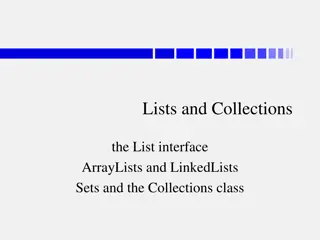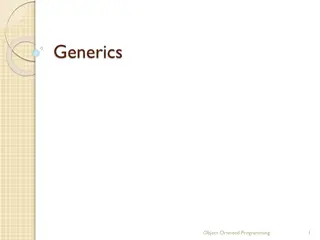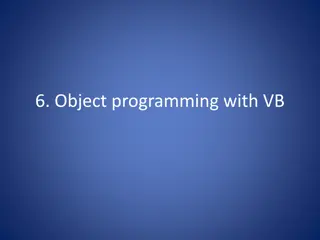
Java Collections Framework Overview and Implementations
Explore the Java Collections Framework, including interfaces, implementations, algorithms, and online resources for Java 8 API. Learn about collection interfaces, examples, general-purpose implementations, and more. Dive into the world of Java collections to enhance your programming skills.
Download Presentation

Please find below an Image/Link to download the presentation.
The content on the website is provided AS IS for your information and personal use only. It may not be sold, licensed, or shared on other websites without obtaining consent from the author. If you encounter any issues during the download, it is possible that the publisher has removed the file from their server.
You are allowed to download the files provided on this website for personal or commercial use, subject to the condition that they are used lawfully. All files are the property of their respective owners.
The content on the website is provided AS IS for your information and personal use only. It may not be sold, licensed, or shared on other websites without obtaining consent from the author.
E N D
Presentation Transcript
2 Java Collections Framework Collection: a group of elements Interface Based Design: Java Collections Framework Implementations Interfaces Algorithms
3 Online Resources Java 8 API Specification of the Collections Framework: https://docs.oracle.com/javase/8/docs/technotes/guides /collections/reference.html Oracle Tutorial: http://docs.oracle.com/javase/tutorial/collections/
4 Collection Interfaces Unordered Rejects duplicates Collection<E> Map<K,V> Set<E> List<E> Queue<E> SortedMap<K,V> Unordered Rejects dup. Ordered Rejects duplicates Ordered Allows duplicates FIFO Order Allows duplicates SortedSet<E> Ordered Rejects duplicates
5 A Simple Example Collection<String> stringCollection = Collection<Integer> integerCollection = stringCollection.add("Hello"); integerCollection.add(5); integerCollection.add(new Integer(6));
6 A Simple Example Collection<String> stringCollection = Collection<Integer> integerCollection = Collection , Collection Integer , stringCollection.add("Hello"); Float Double , integerCollection.add(5); integerCollection.add(new Integer(6));
7 A Simple Example Collection<String> stringCollection = Collection<Integer> integerCollection = stringCollection.add("Hello"); integerCollection.add(5); integerCollection.add(new Integer(6)); stringCollection.add(7); integerCollection.add("world"); stringCollection = integerCollection;
8 General Purpose Implementations Class Name Convention: <Data structure> <Interface> Data Structures General Purpose Implementations Hash Table Resizable Array Balanced Tree Linked TreeSet (SortedSet) Set HashSet LinkedHashSet Queue List ArrayDeque LinkedList Interfaces ArrayList LinkedList TreeMap (SortedMap) Map HashMap LinkedHashMap
9 Adding Implementations to the Picture No Direct Implementation <<interface>> Collection <<interface>> Map <<interface>> SortedMap <<interface>> Set <<interface>> List <<interface>> Queue <<interface>> SortedSet HashSet TreeSet HashMap ArrayList LinkedList TreeMap
10 Collection interface Collection<E> : description method name ensures that this collection contains the specified element (optional operation) Boolean add(E e) Removes a single instance of the specified element from this collection, if it is present (optional operation). boolean remove(Object o) removes all elements in the Collection void clear() returns true if this collection contains the specified element boolean contains(Object o) returns true if this collection contains no elements boolean isEmpty() returns the number of elements in this collection. int size() returns an iterator over the elements in this collection. Iterator<E> iterator() : http://docs.oracle.com/javase/8/docs/api/java/util/Collection.html
11 Map interface Map<K,V> : description method name associates the specified value with the specified key in this map (optional operation) boolean put(K key, V value) removes the mapping for a key from this map if it is present (optional operation). boolean remove(Object o) removes all of the mappings from this map (optional operation). void clear() returns true if this map contains a mapping for the specified key boolean containsKey(Object key) returns true if this collection contains no elements boolean isEmpty() returns the number of key-value mappings in this map. int size() returns a set view of the keys contained in this map Set<K> keySet() returns a Collection view of the values contained in this map. Collection<V> values() : http://docs.oracle.com/javase/8/docs/api/java/util/Map.html
12 List Example List<Integer> list = new ArrayList<Integer>(); list.add(3); list.add(1); list.add(new Integer(1)); list.add(new Integer(6)); list.remove(list.size()-1); System.out.println(list); auto-boxing Integer remove . , ArrayList Output: toString . [3, 1, 1]
13 Set Example Set<Integer> set = new HashSet<Integer>(); set.add(3); set.add(1); set.add(new Integer(1)); set.add(new Integer(6)); set.remove(6); System.out.println(set); Set . x null x.equals(y) == true x y y : .1 .2 ( .) remove() , Output: [1, 3] or [3, 1] TreeSet LinkedHashSet "
14 Map Example Map<String, String> map = new HashMap<String, String>(); map.put("Dan", "03-9516743"); map.put("Rita", "09-5076452"); map.put("Leo", "08-5530098"); map.put("Rita", "06-8201124"); System.out.println(map); Output: {Leo=08-5530098, Dan=03-9516743, Rita=06-8201124} Keys (names) Values (phone numbers) Dan Rita Leo 03-9516743 09-5076452 08-5530098 06-8201124
15 LinkedHashMap Example Map<String, String> map = new LinkedHashMap<String, String>(); map.put("Dan", "03-9516743"); map.put("Rita", "09-5076452"); map.put("Leo", "08-5530098"); map.put("Rita", "06-8201124"); System.out.println(map); ) ( Output: {Dan=03-9516743, Rita=06-8201124, Leo=08-5530098} Keys (names) Values (phone numbers) Dan Rita Leo 03-9516743 06-8201124 08-5530098
16 SortedMap Example SortedMap <String,String> map = new TreeMap<String,String> (); map.put("Dan", "03-9516743"); map.put("Rita", "09-5076452"); map.put("Leo", "08-5530098"); map.put("Rita", "06-8201124"); System.out.println(map); Output: {Dan=03-9516743, Leo=08-5530098, Rita=06-8201124} Keys (names) Values (phone numbers) Dan Leo Rita 03-9516743 08-5530098 06-8201124
17 Map Collection Views A Map is not Iterable! Three views of a Map<K,V> as a collection keySet values entrySet Set<K> Set<Map.Entry<K,V>> Collection<V> The Set of key-value pairs (implement Map.Entry)
18 Iterating Over the Keys of a Map Map<String,String> map = new HashMap<String,String> (); map.put("Dan", "03-9516743"); map.put("Rita", "09-5076452"); map.put("Leo", "08-5530098"); map.put("Rita", "06-8201124"); for (String key : map.keySet()) { System.out.println(key); } Output: Leo Dan Rita
19 Iterating Over the Key-Value Pairs of a Map Map<String,String> map = new HashMap<String,String> (); map.put("Dan", "03-9516743"); Set<Map.Entry<K,V>> map.put("Rita", "09-5076452"); map.put("Leo", "08-5530098"); . map.put("Rita", "06-8201124"); for (Map.Entry<String,String> entry: map.entrySet()) { System.out.println(entry.getKey() + ": " + entry.getValue()); } Output: Leo: 08-5530098 Dan: 03-9516743 Rita: 06-8201124
20 Collection Algorithms Defined in the Collections class Main algorithms: sort binarySearch reverse shuffle min max
21 Sorting publicclass Sort { publicstaticvoid main(String args[]) { List<String> list = Arrays.asList(args); Collections.sort(list); System.out.println(list); Returns a list view of the array } } Arguments: A C D B Output: [A, B, C, D]
22 How can we sort a list of objects? 1. Collections.sort(myList) myList s elements implement Comparable<T> interface. public interface Comparable<T> { /********************************** * $ret < 0 if this < other * * $ret = 0 if this.equals(other) * * $ret > 0 if this > other * **********************************/ public int compareTo(T other); } Error when sorting a list whose elements - do not implement Comparable or - are not mutually comparable. String implements the interface Comparable<String> so we are able to sort a list of strings.
23 How can we sort a list of objects? 1. Collections.sort(myList, myComparator) myComparator implement Comparator<T> interface. public interface Comparator<T>{ /********************************** * $ret < 0 if o1 < o2 * * $ret = 0 if o1.equals(o2) * * $ret > 0 if o1 > o2 * **********************************/ public int compare(T o1, T o2); } The comparator interface enables us to sort a list of the same object by different critiria, using different comparators.
24 Comparable and Comparator Example Write the class Point that represents a point in the plane How to sort List<Point>? public class Point { private int x; private int y; ... } Two options: Make Point implement Comparable<Point>, and use Collections.sort Write a class that implements Comparator<Point>, and pass it as an argument to Collections.sort. Don t: write a sorting algorithm yourselves! Recommended Tutorial: http://docs.oracle.com/javase/tutorial/collections/interfaces/order.h tml
25 Implementing Comparable public class Point implements Comparable<Point>{ public int compareTo(Point other) { //comparison by the x axis Integer.compare(this.x, other.x); } } The program: List<Point> pointList = new LinkedList<Point>(); pointList.add(new Point(1, 3)); pointList.add(new Point(0, 6)); Collections.sort(pointList); System.out.println(pointList); Output: [(0,6), (1,3)]
26 Writing a Comparator public class YAxisPointComparator implements Comparator<Point> { public int compare(Point p1, Point p2) { //comparison by the y axis return Integer.compare(p1.getY(), p2.getY()); } } The program: List<Point> pointList = new LinkedList<Point>(); pointList.add(new Point(1, 3)); pointList.add(new Point(0, 6)); Collections.sort(pointList, new YAxisPointComparator()); System.out.println(pointList); The output: [(1,3), (0,6)] Useful for sorting existing classes (e.g., String)
27 Best Practice <with generics> Specify an element type only when a collection is instantiated: Set<String> s = new HashSet<String>(); Implementation Interface Works, but public void foo(HashSet<String> s){ } public void foo(Set<String> s) { } s.add() invokes HashSet.add() Better! polymorphism
28 Diamond Notation Set<String> s = new HashSet<String>(); Set<String> s = new HashSet<>(); No need to specify the generic type in a new statement Map<String, List<String>> myMap = new HashMap<String, List<String>>(); Map<String, List<String>> myMap = new HashMap<>(); Not the same as: Map<String, List<String>> myMap = new HashMap(); (Compilation warning)
29 Queue Example Queue<Integer> queue = new LinkedList<>(); queue.add(3); queue.add(1); queue.add(new Integer(1)); queue.add(new Integer(6)); queue.remove(); System.out.println(queue); List Queue remove , ) ( Output: [1, 1, 6]
30 LinkedHashSetExample Set<Integer> set = new LinkedHashSet<>(); set.add(3); set.add(1); set.add(new Integer(1)); set.add(new Integer(6)); set.remove(6); System.out.println(set); Set . Output: [3, 1] ( " .)
31 TreeSetExample Set<Integer> set = new TreeSet<>(); set.add(3); set.add(1); set.add(new Integer(1)); set.add(new Integer(6)); set.remove(6); System.out.println(set); Set . Output: [1, 3] . " " Comparator "




